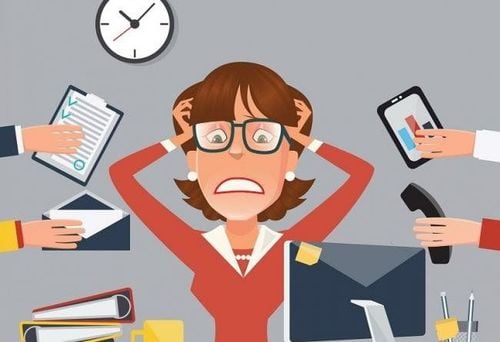This is an automatically translated article.
In addition to the 40 - 50 hour/week period, workers also suffer from other factors leading to burnout, including travel distance, responsibilities, working environment, recognition and job satisfaction. Obviously, working too much harms both physical and mental health.1. Harms caused by looking to alcohol to relax
Working more than 40 hours per week can lead to heavy drinking. This form of relaxation increases your risk of health problems and even a life-threatening situation if you drink too much.Instead of going to alcohol to relax, you can take advantage of the time you have on your way to work to rest. Try to avoid staring at electronic screens on the way home to continue handling daily tasks. Instead, listen to your favorite playlist, audiobook, or podcast.
2. Work productivity is stalled
If you've increased your working hours and still don't see significant results, your productivity may be falling. One study found that people who overwork 70 hours per week don't actually get more done than people who work 56 hours a week. Our brains don't have the capacity to be productive every minute of every day. So more time doesn't mean more work.To avoid being overwhelmed, you should limit handling everything at once. Multitasking can actually make you get less done. Instead, experts suggest focusing on solving your top 3 priority tasks each day. Using organization and time management methods can help you be more efficient and productive.

Làm việc quá nhiều có thể khiến năng suất của bạn bị đình trệ
3. Not getting enough sleep and being tired during the day
Apparently, staying up late leads to less sleep and more daytime fatigue. If you work throughout the day for a long period of time, it will be difficult to calm down at bedtime. Poor sleep not only makes you uncomfortable, but it also reduces productivity and increases your risk of chronic diseases like: Type 2 diabetes and heart disease.Give yourself a break by balancing your work-life balance with 52 minutes of continuous work and 17 minutes of breaks. Take a 17-minute break during the day to go for a walk outside, talk to a friend, or do some gentle stretching. These simple activities can help you overcome daytime sleepiness, as well as limit the harmful effects of working too much.
4. Sadness, depression
Do you feel like you only really live on weekends (non-work days)? Working too much can affect your mental health. One study found that people who work 11 hours a day are more likely to face depression than people who work 7 to 8 hours a day.Mindfulness meditation keeps your mind from getting confused or “going in 100 directions”. This method is like pressing a button to restart yourself. If it's not convenient to attend a meditation workshop or see a therapist, you can even use a meditation app on your way home from work (for those who don't drive themselves).
5. The heart also has to work overtime
You may not really notice it, but work stress can release cortisol, the hormone that makes your heart work harder. This can increase your risk of stroke, coronary heart disease, type 2 diabetes, and even cancer.The solution to too much sitting is to use a standing desk in the office. Alternatively, try holding more standing meetings or plan a break with co-workers by going for a brisk walk outside. You can also plan to have lunch in another area instead of sitting at your desk. Remember that every step has value, limit working too much harmful to health.
6. Back and neck pain
Repetitive activity is not always good. One study found that the more hours people worked, the higher the risk of back pain. For women, the pain tends to be in the neck, while for men, the pain is more common in the lower back. This is a common sign of muscle tension, experts say.If you are really suffering from stress, seek supportive therapy. Back pain or trouble sleeping is not normal. So discuss your personal situation with a psychologist for guidance on how to enjoy life more.

Lưng, cổ bạn dễ gặp vấn đề hơn nếu bạn làm việc quá nhiều
7. Affected Relationships
Not only does it take time to nurture relationships, but the stress, fatigue, and depression you're experiencing due to work can also affect those around you.Work can take up a lot of your time, especially if you are self-employed. To relieve pressure, include non-work-related activities on your daily to-do list, such as exercising, listening to music, or hanging out with friends. Try to prioritize interesting content in your schedule every week or every day if possible.
Finally, if you are working long hours without feeling productive or unrecognized, think about your achievements and contributions to the company, as well as the harmful effects of working too much, then go to the boss to present. Having happy and productive members is important in an organization. However, a good work-life balance will increase employee loyalty and dedication.
Please dial HOTLINE for more information or register for an appointment HERE. Download MyVinmec app to make appointments faster and to manage your bookings easily.
Reference source: healthline.com












